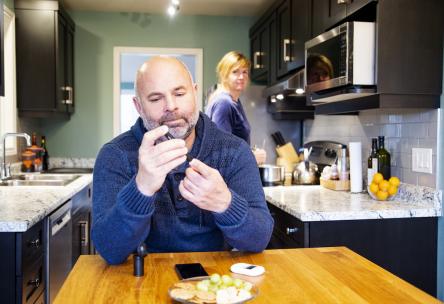Here are five steps to practice after a diabetes diagnosis for a healthier lifestyle and positive mindset

If you’ve just been diagnosed with diabetes, you might be feeling scared, upset, and overwhelmed. By taking the time to educate yourself you can make changes to your lifestyle that will help you feel better and get a handle on your diabetes.
Follow this action plan from Maggie Powers, PhD, RD, and a former president of health care and education at the American Diabetes Association.
Breathe
“The first thing I say to newly diagnosed patients is ‘take a deep breath and know there are people out there to help you,’” says Powers. If you feel overwhelmed, that’ll make it difficult for you to make the next steps and manage your diabetes adequately.
“Diabetes is 99 percent self-management,” says Powers. You’re only with your certified diabetes expert (CDE), dietician, and endocrinologist a short amount of time so it’s important to know how to manage your food, medication and call on the experts when you’re unsure of what to know.
Read the right materials
Before you start searching the Internet everything from “what to eat” to “worst case scenarios,” make sure you’re checking out reputable sources for information. The American Diabetes Association helps answer questions, provides materials on living with diabetes, food, fitness, research and even provides information for caregivers.
Get help with your meals
Sit down with your CDE or nutritionist and talk to them about your daily diet and how your favorite foods can fit into your meal plan. Powers says she’ll usually look at several days of food records with patients and discuss what they’re eating, portion sizes, how they’re preparing foods, meal timing and what they’re drinking.
“We often teach carbohydrate counting as part of the initial food plan to show patients how their carbohydrates fit into a diabetes eating plan,” says Powers. “I want the diabetics I see to leave feeling comfortable and confident making these food decisions in a variety of settings,” she says.
Be more active
When you’re newly diagnosed, your doctor and diabetes team may encourage you to balance your food and medication first and then add exercise. Once your doctor has given his or her approval, aim for 150 minutes of moderate-to-vigorous intensity aerobic exercise each week. Dividing the exercise time into chunks such as 30 minutes over five days will help to make it more manageable.
If possible, try not to go more than two days a week without exercising. You might want to start wearing a pedometer to see what your daily baseline walking numbers are and then aim to increase those by 2,000 a day if you’re just starting out.
“Make sure talk to your physician about how to exercise safely with diabetes as well as your short-term and long-term goals, says Powers.” Add strength training and balancing exercises to your weekly workout regimen as well. The ADA has suggested exercise plans to get you started.
Get support
Ask your doctor for a referral to a CDE or registered dietician and find an expert you can talk to about your condition. You might also want to attend a group counseling session or learning seminar in your neighborhood.
“Group classes are fun and other people often raise questions you’re thinking of asking,” says Powers. Your family members can be another underutilized resource for support! Bring your partner to one of your doctor’s appointments, or take your family food shopping with you and educate them about what you’re looking for when it comes to healthy foods and nutrition label reading. “There’s a lot of hope to have about your diabetes diagnosis if you get the right team around you,” says Powers. “You have to take your diagnosis seriously, but you should feel confident they can live well with diabetes and have it fit your lifestyle.”